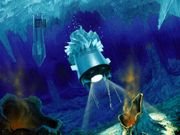Eureka, Europa!
Evolution is awesome. I can't even begin to wrap my head around it. I love that we're discovering missing links.
Fossil animals found in Arctic Canada provide a snapshot of fish evolving into land animals, scientists say.
But right now I'm more interested in space. Last weekend I saw a film at the Smithsonian's IMAX. It was about the strange creatures deep in the ocean, but it also talked a lot about space and the creatures in our ocean that exist without ever having come into contact with sunlight. This movie suggested that life in outer space, specifically the hypothetical life that exists in the hypothetical ocean underneath the layers of ice on Jupiter's moon Europa, will look much like life in the deepest parts of our oceans on Earth.

If I was Bill Gates, instead of a soon-to-be unemployed law school dropout hounded by loan officers, I would fund this.
The 2006 NASA budget includes Congressional language imploring NASA to fund a mission that would orbit Europa. Such a mission would be able to confirm a subsurface ocean using gravity and altimetry measurements, elucidate the origin of surface features by imaging much of the surface at high resolution, constrain the chemistry of surface materials using spectroscopy, and probe for subsurface liquid water using ice-penetrating radar. The mission might even carry a small lander to determine the surface chemistry directly, and to measure seismic waves, from which the level of activity and ice thickness could be determined. However, at present it is far from certain that NASA will actually fund this mission, as funding for it is not included in NASA's 2007 budget plan.
More ambitious ideas have been put forward for a capable lander to test for evidence of life that might be frozen in the shallow subsurface, or even to directly explore the possible ocean beneath Europa's ice. One proposal calls for a large nuclear powered "Melt Probe" (cryobot) which would melt through the ice until it hit the ocean below. Once it reached the water, it would deploy an autononomous underwater vehicle (hydrobot), which would gather information and send it back to Earth. Both the cryobot and the hydrobot would undergo some form of extreme sterilization to negate the chance of contamination to any possible ecosystem on Europa. This proposed mission has not yet reached a serious planning stage.
Unfortunately, I lack both the green stuff and the intelligence to perform the engineering feats necessary to build the robots and nuclear missiles that could break through the ice barrier on Europa. But, it would be amazing if Europa contained an ocean, hydrothermal vents at the bottom of that ocean, and the ocean was actually an incubator for all kinds of life.
... well... let's make it just the one-celled organism stuff. I don't really want this.











0 Comments:
Post a Comment
<< Home